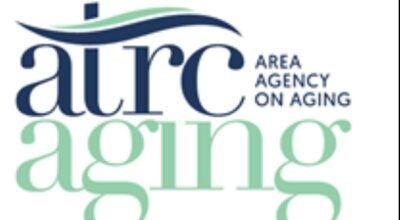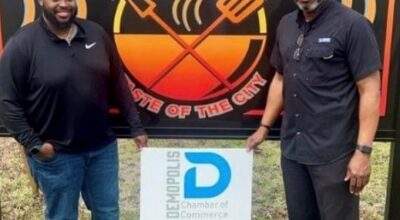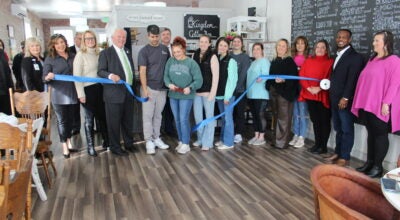DMS teacher Mayben honored by Georgia-Pacific
Published 4:37 pm Tuesday, June 10, 2014

Shown from left to right are Kelvin J. Hill, vice president of Georgia-Pacific’s Naheola operations; Meggin Mayben, 2014 Keystone Teacher’s Development Winner; and Blaine Hathcock, principal of Demopolis Middle School.
Meggin Mayben, an eighth-grade social studies teacher at Demopolis Middle School, has been selected by Georgia-Pacific to attend Keystone Science School’s 2014 Key Issues Institute: Bringing Environmental Issues to the Classroom, this summer in Silverthorne, Colo.
Held every June and July, the Key Issues program brings together middle-level educators from around the world for a highly interactive four and a half-day workshop. The program is designed to help teachers of all subjects build students’ critical thinking skills. At the same time it reinforces teachers’ confidence and skills in bringing environmental issues and STEM-based principles into the classroom. Teachers learn to present scientific concepts in an unbiased way to their students while discovering ways to make environmental issues and STEM fun and interesting.
Mayben is one of 10 teachers sponsored to attend from Georgia-Pacific’s facility communities in Alabama, Arkansas, Florida, Georgia, Mississippi, Texas and Wisconsin.
“Georgia-Pacific is proud to support teachers by helping them bring important environmental issues to life for their students,” said Kelvin J. Hill, vice president of operations for GP at Naheola Mill. “One of the most valuable benefits of the Keystone Science School program is that the teachers bring back the skills they’ve learned and teach these valuable lessons in our communities year after year.”
At Key Issues, teachers work in teams to solve “real-life” scenarios such as investigating the source of a town’s health epidemic, testing water quality of a nearby river and building a sustainable cable-car model. Teachers bring home lesson plans and lab kits to apply what they’ve learned to their local classrooms. The Institute also coordinates ongoing support from other educators and instructors online.
Since 1997, Georgia-Pacific has sponsored more than 150 teachers from its facility communities across the country to attend Keystone Science School.
“Mrs. Mayben is an excellent candidate for this professional learning opportunity,” said Blaine Hathcock, principal, Demopolis Middle School. “She is a dynamic teacher who incorporates hands-on experiences and innovative teaching strategies into her lessons on a regular basis. The curriculum presented at the institute will be a valuable tool to help further her growth as a 21st Century educator and will benefit the students at our school and community during the upcoming school year.”
Hear from the teachers on their Key Issues experience by following the hashtag #KI2014 in June in July.
Support of Keystone Science School is just one example of critical community investments made by Georgia-Pacific. Annually, Georgia-Pacific contributes through in-kind giving and direct contributions to causes and organizations aligned with its philanthropic focus areas: education, environment, entrepreneurship and enrichment of our communities.
Headquartered in Atlanta, Georgia-Pacific is one of the world’s leading manufacturers and marketers of building products, tissue, packaging, paper, cellulose and related chemicals. The company employs nearly 35,000 people worldwide. Founded in 1958, the Georgia-Pacific Foundation has four key investment areas – education, community enrichment, the environment and entrepreneurship. For more information on the Georgia-Pacific Foundation, visit www.gp.com/gpfoundation.
Since 1976, Keystone Science School has taught scientific principles and leadership skills to young people, teachers, and community members through engaging hands-on field experiences.
The School was founded on the belief that leaders should approach decision-making with a healthy respect for scientific inquiry, collaboration, and civic engagement. Our programs prepare future leaders to address the increasingly complex issues our society faces. For more information, visit www.KeystoneScienceSchool.org.





